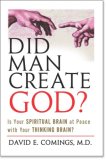The
advent of quantum theory and the Heisenberg Uncertainty Principle put
an end to the philosophy of determinism. Free will was restored to
humans but at the price of having multiple and uncertain outcomes.
Because of this uncertainty we cannot predict our future. Since God
would not disobey his own laws, God also cannot predict or preordain
the future. [257]
Quantum
entanglement has often been used to support the philosophy of Eastern
religions of a cosmic consciousness in which all parts of the universe
are interconnected. However, since information cannot be passed by
entanglement, and since communication is the key to any meaningful
interconnection, basing cosmic consciousness on quantum theory is a
fantasy. [p259]
The Big
Bang theory proposes that the universe suddenly arose from virtually nothing.
It has been seized upon by theists as one of the “proofs” that
God exists. This is based on their assumption that only God can make something
out of nothing. [p225]
While the scientific evidence for the Big Bang is overwhelming, the weirdness of quantum mechanics, or the collision of parallel universes, or the presence of multiverses, is sufficient to show how the inflation started and thus to explain the creation of the universe. No supernatural being is required. [261]
The Anthropic Principle states that the laws of nature are arranged so that life and consciousness are possible. This has been proposed because there are a number of cosmological constants that had to be "just right" for life to occur. Many individuals including some scientists have suggested that the Anthropic Principle proves that God exists since only a divine presence could fine-tune the universe with such accuracy. Other interpretations that do not require a divine presence. [p252]
The Anthropic Principle is a straw man, weakened by the fact that it is basically a tautology [circular argument]. It can be eliminated altogether by multiple universes, quantum mechanics and M-theory. The Anthropic Principle cannot be relied upon to prove that God exists. [264]
The philosophical and mystical views of the cream of the creative thinkers in modern physics show that most were unanimous in their agreement that modern physics offers no positive support for mysticism or transcendentalism of any variety. Despite this many had a mystical bent based on their feeling that the equations of physics may not represent the totality of reality. This illustrates the basic premise of this book - that humans with highly developed rational brains can also have a well-developed sense of spirituality. However, other physicists disagree and correctly point out that the new physics provides an incredibly accurate prediction of reality, a picture that is far closer to the absolute truth than metaphysics could ever provide.
In conclusion, there is nothing in quantum mechanics, the theory of relativity, string theory, or the Anthropic Principle that provides proof of the existence of God, mysticism or transcendentalism. To the contrary, one could argue that quantum theory and string theory show us that the universe is capable of being created, if not from nothing, at least from almost nothing, without the need of divine intervention. These two theories certainly allow us to again use Occam's Razor to resolve the question - "Was the universe created as a consequence of features of quantum physics and M-theory, or was it created by God?" If the answer is that the universe was created by God, this again raises the infinitely more complex question of - Who Created God? I suspect Occam would have choosen quantum physics as the creator of the universe. [p267]
